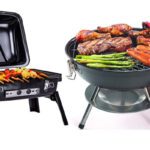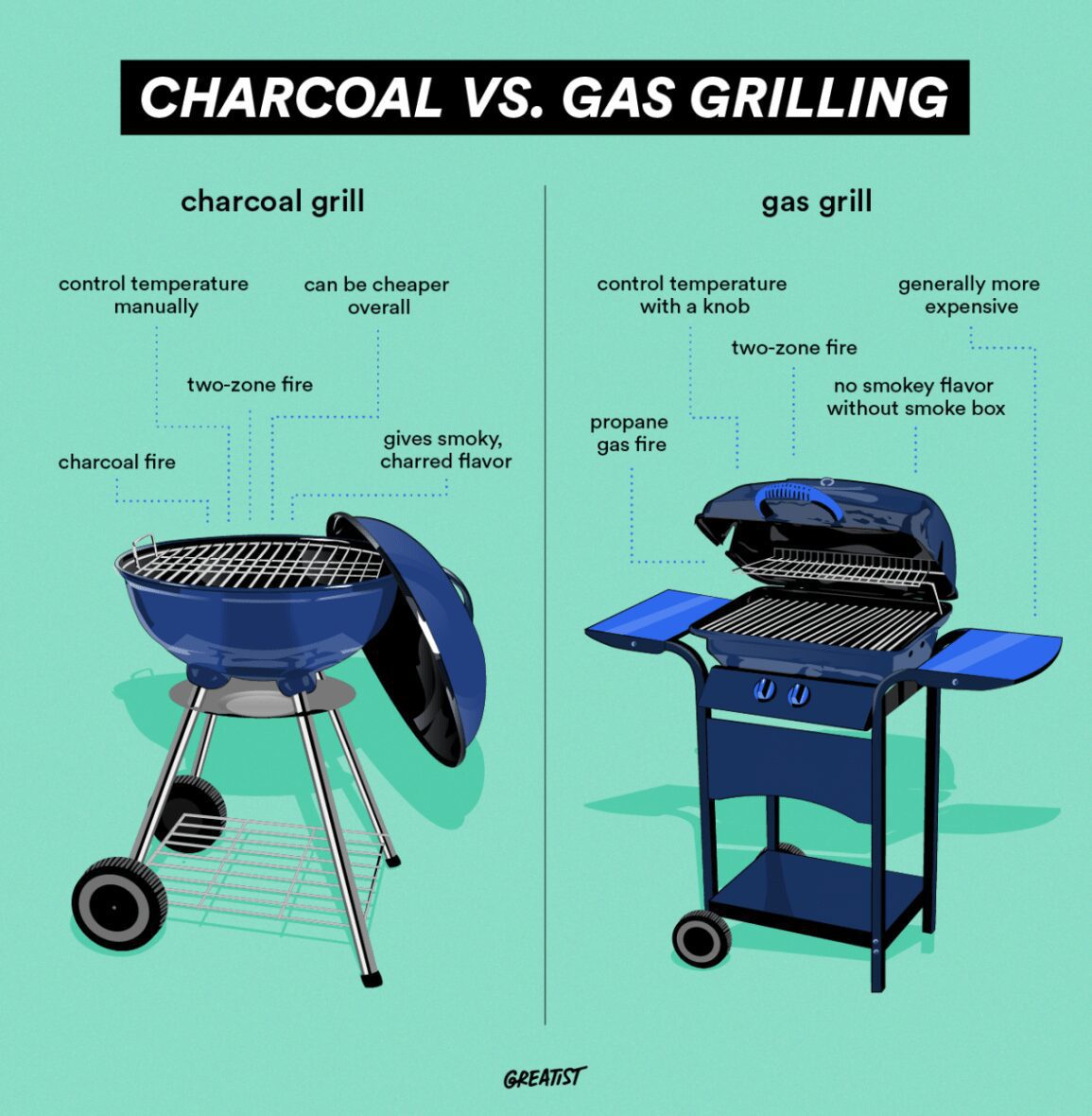
If you’re a barbecue enthusiast, you’ve probably wondered about the health impact of grilling with gas or charcoal. With the debate between the two methods continuing to sizzle, it’s time to uncover the truth behind this smoky dilemma.
While both gas and charcoal grills bring their own distinct flavors to your backyard cooking, it’s essential to understand the health implications of each option. So, whether you prefer the convenience of gas or the smoky char of charcoal, read on to discover which grilling method takes the crown in terms of health benefits.
Flavors and Aromas:
Gas Grill Flavor
Grilling with a gas grill can provide a unique and delicious flavor to your food. Gas grills use a combination of heat and flavor-enhancing materials such as lava rocks or ceramic briquettes to create a smoky flavor.
While it may not be as intense as the flavor produced by a charcoal grill, gas grills still offer a pleasant and charred taste that many people enjoy. Additionally, gas grills allow for precise temperature control, ensuring that your food is cooked evenly and to your desired level of doneness.
Charcoal Grill Flavor
If you prefer a more traditional and robust smoky flavor, then grilling with charcoal is the way to go. Charcoal grills produce a distinct flavor and aroma that is hard to replicate with any other cooking method.
The charcoal briquettes or lump charcoal used in these grills impart a strong and authentic smoky taste to your food, elevating the overall grilling experience. The high heat generated by charcoal grills also helps to sear the exterior of the food, creating a delicious crispy crust.
Health Effects of Grilled Foods
When it comes to the health effects of grilled foods, it’s important to consider factors beyond just the flavor. Grilling can have both positive and negative effects on the nutritional content of your food. While grilling helps to retain moisture and enhance the natural flavors of food, it can also lead to the formation of potentially harmful compounds.
These compounds, such as heterocyclic amines (HCAs) and polycyclic aromatic hydrocarbons (PAHs), are formed when meats, poultry, and fish are cooked at high temperatures, especially when fat drippings cause flare-ups or charring.
Emission of Harmful Substances:
Gas Grill Emissions
Gas grills are generally considered to emit fewer harmful substances compared to charcoal grills. The use of propane or natural gas as a fuel source in gas grills results in a cleaner combustion process. This means that there is less production of smoke, soot, and particulate matter, which can potentially be harmful to both the environment and your health.
However, it’s important to note that the use of gas grills can still result in the emission of carbon monoxide and other gases, so proper ventilation is essential when grilling indoors or in enclosed spaces.
Charcoal Grill Emissions
Charcoal grills, on the other hand, produce more emissions compared to gas grills. The burning of charcoal generates smoke, which contains a variety of potentially harmful compounds such as carbon monoxide, nitrogen oxides, and volatile organic compounds (VOCs).
These emissions not only contribute to air pollution but can also pose health risks, especially when grilling in poorly ventilated areas. It’s crucial to ensure that charcoal grills are used in open spaces or well-ventilated areas to minimize exposure to these emissions.
Health Implications
The emissions from both gas and charcoal grills can have health implications, especially when exposed to them for prolonged periods or in high concentrations. Inhalation of carbon monoxide can lead to carbon monoxide poisoning, which can be life-threatening.
VOCs and other combustion byproducts can also irritate the respiratory system and contribute to the development of respiratory conditions such as asthma and chronic obstructive pulmonary disease (COPD). To minimize health risks, it is essential to use grills in well-ventilated areas and avoid prolonged exposure to grill emissions.
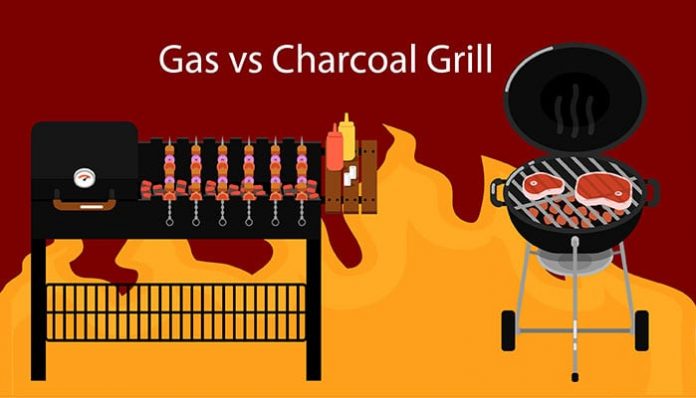
This image is property of grillsforever.com.
Temperature Control:
Gas Grill Temperature Control
Gas grills offer excellent temperature control, allowing you to adjust the heat with precision. They typically feature multiple burners that can be individually controlled, enabling you to create different heat zones on the grill. This versatility is beneficial when cooking different types of food that require varying heat levels. The ability to regulate the temperature accurately helps to prevent under or overcooking, resulting in perfectly cooked dishes every time.
Charcoal Grill Temperature Control
Temperature control with a charcoal grill can be more challenging compared to a gas grill. The heat level is primarily determined by the amount and arrangement of charcoal, as well as air intake control. Achieving and maintaining a specific temperature can take some practice and requires attention to detail.
It’s important to allow enough time for the charcoal to reach the desired temperature and regularly adjust the vents to control the airflow. While this may require some additional effort, mastering temperature control with a charcoal grill can lead to exceptional results.
Impact on Health
The impact of temperature control on health is primarily related to the cooking of the food itself rather than the grilling method. Overcooking or charring food at high temperatures can lead to the formation of HCAs and PAHs, as mentioned earlier.
These compounds have been associated with an increased risk of cancer when consumed in large quantities. Proper temperature control, regardless of the grill type, can help minimize the formation of these harmful compounds. It is recommended to use a food thermometer to ensure that meats and other high-risk foods are cooked to safe internal temperatures.
Convenience and Time:
Gas Grill Convenience
Gas grills offer unparalleled convenience, making them a popular choice for many outdoor cooking enthusiasts. With the simple push of a button or turn of a knob, you can easily ignite the grill and have it ready for cooking within minutes.
Gas grills also eliminate the need to handle messy and potentially hazardous substances such as charcoal or lighter fluid. Additionally, most gas grills come equipped with features such as side burners, built-in storage, and rotisserie attachments, further enhancing their convenience and versatility.
Charcoal Grill Convenience
While charcoal grills may require more time and effort to set up and ignite, many avid grillers appreciate the unique charm and ritual associated with charcoal grilling. From arranging the charcoal to lighting it and patiently waiting for it to reach the desired temperature, charcoal grilling can be a rewarding and satisfying experience.
Some people enjoy the process of building a charcoal fire, as it allows them to connect with the traditional art of grilling and adds an element of nostalgia to their outdoor cooking endeavors.
Time Considerations
When it comes to grilling time, gas grills typically have the edge over charcoal grills. Gas grills heat up quickly and evenly, allowing you to start cooking almost immediately. On the other hand, charcoal grills require more time to light the charcoal and reach the desired temperature.
This extra time can be an advantage for those who prefer a more leisurely approach to grilling and enjoy the anticipation and preparation. However, if you are short on time or looking for a quick and efficient grilling experience, a gas grill may be the better option.
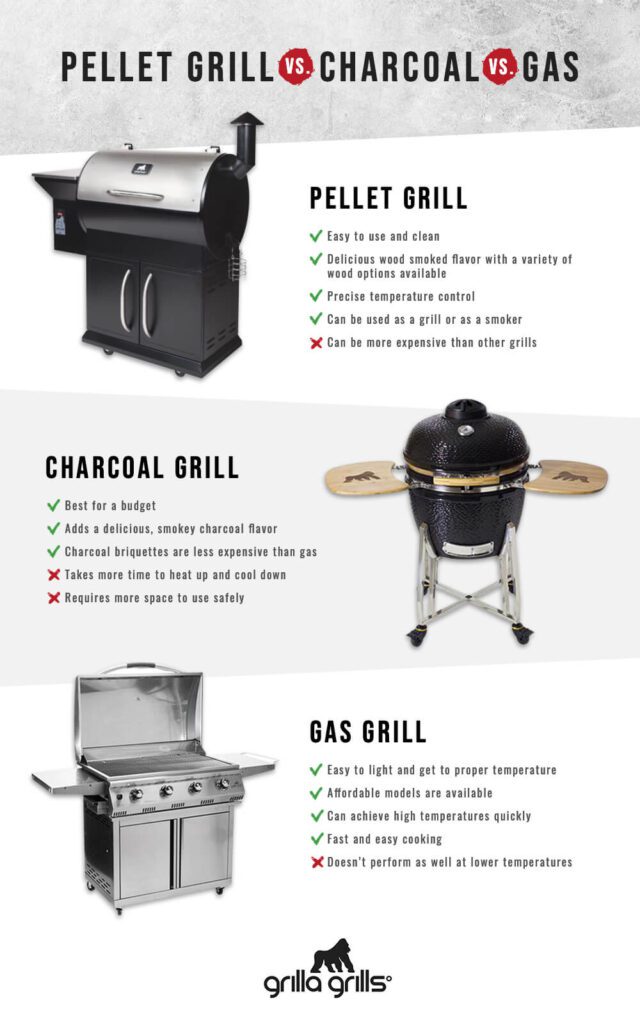
This image is property of cms.grillagrills.com.
Price and Availability:
Gas Grill Price Range
Gas grills tend to have a higher initial cost compared to charcoal grills. The price range for gas grills can vary significantly depending on the size, features, and quality of the grill. Entry-level gas grills can be relatively affordable, starting at around $200, while high-end models with advanced features can cost several thousand dollars. Additional expenses to consider include the cost of fuel, such as propane or natural gas, as well as regular maintenance and replacement of parts.
Charcoal Grill Price Range
Charcoal grills generally have a lower initial cost compared to gas grills. The price range for charcoal grills is typically more budget-friendly, with entry-level models starting at around $50. Higher-end charcoal grills with added features or larger cooking surfaces can range up to a few hundred dollars. Charcoal grills also have lower ongoing costs, as charcoal briquettes or lump charcoal are relatively inexpensive compared to gas fuel. However, it’s important to note that the cost of charcoal can add up over time, especially with regular grilling.
Availability of Gas and Charcoal
Gas grills and charcoal grills are widely available, making them accessible to most consumers. Gas grills can be found in specialty grill stores, home improvement centers, and online retailers, while portable gas grills are commonly available at camping or outdoor supply stores.
Charcoal grills are also readily available at similar locations, with a wide range of options to choose from. Whether you prefer the convenience of gas or the authenticity of charcoal, finding a grill that suits your needs and budget should not be a challenge.
Portability and Versatility:
Gas Grill Portability
When it comes to portability, gas grills have a clear advantage. Most gas grills are designed with mobility in mind, featuring wheels and compact designs that make them easy to transport.
Portable gas grills are available in various sizes, making them suitable for picnics, camping trips, and other outdoor adventures. Gas grills are also versatile in terms of fuel options, as they can be used with either propane tanks or connected to a natural gas line if available.
Charcoal Grill Portability
While charcoal grills may not be as inherently portable as gas grills, there are still options available for those who prioritize mobility. Portable charcoal grills are designed to be lightweight and compact, making them ideal for tailgating, beach outings, or camping.
These grills often feature hinged lids for easy transport and foldable legs for space-saving storage. Charcoal grills are also versatile, as they can be used in a variety of outdoor settings, provided there is access to charcoal and proper ventilation.
Versatility of Gas and Charcoal Grills
Both gas and charcoal grills offer versatility in terms of cooking capabilities and accessories. Gas grills allow for precise temperature control, making them suitable for a wide range of cooking techniques, from direct grilling to indirect heat for roasting or smoking.
They also often come with additional features such as side burners for cooking sauces and side dishes simultaneously. Charcoal grills, on the other hand, are well-known for their ability to impart a unique smoky flavor to food and can handle high-heat searing as well as slow and low cooking.
Both grill types have a variety of accessories available, such as grilling baskets, rotisserie attachments, and pizza stones, to enhance your grilling experience.
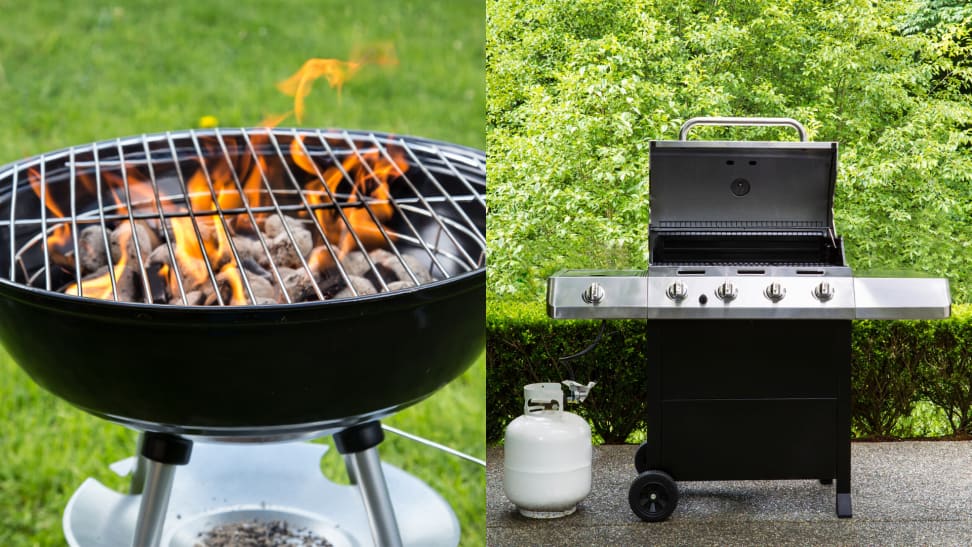
This image is property of reviewed-com-res.cloudinary.com.
Maintenance and Cleaning
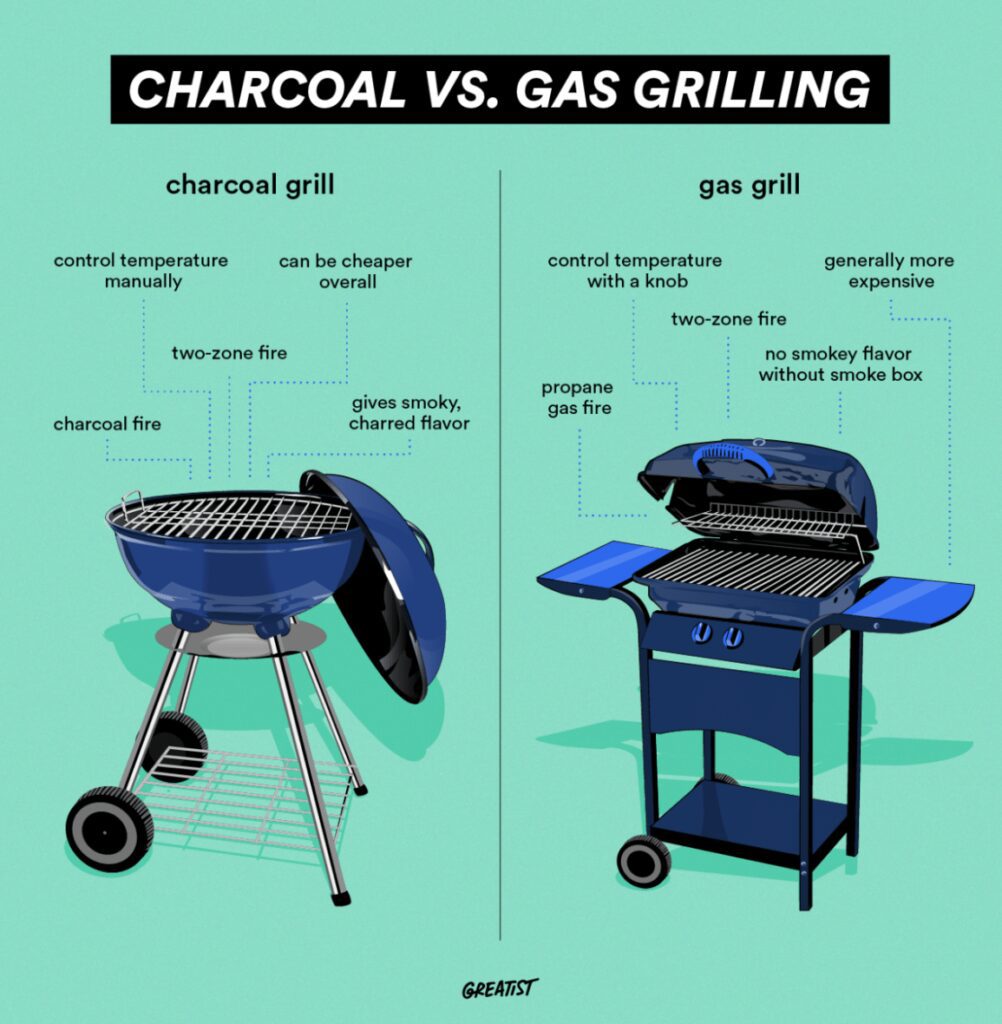
This image is property of i0.wp.com.
Gas Grill Maintenance
Gas grills typically require less maintenance compared to charcoal grills. Regular maintenance tasks for gas grills include cleaning the grates, burners, and grease management system. It is important to keep the gas jets and burner ports free from blockages to ensure proper gas flow.

Additionally, a periodic check of the gas hose and connections is necessary to ensure there are no leaks. Following the manufacturer’s guidelines for maintenance and cleaning will help prolong the lifespan of your gas grill and ensure safe and efficient operation.
Charcoal Grill Maintenance
Charcoal grills require more frequent cleaning and maintenance compared to gas grills due to the accumulation of ash and grease. After each use, it is necessary to remove the ashes from the grill and clean the grates thoroughly to prevent buildup.

The vents and ashtray should be checked regularly and cleared of any obstructions. Another important aspect of charcoal grill maintenance is the replacement of worn-out parts, such as charcoal grates or dampers, to ensure optimal performance. With proper care and cleaning, a charcoal grill can provide years of reliable use.
Cleaning and Health Implications
Proper cleaning of grills is essential for both hygiene and health. Residue from previous cooking sessions, such as charred bits or leftover grease, can become a breeding ground for bacteria and mold. Regular cleaning helps prevent cross-contamination and ensures that your food is safe to eat.
Additionally, cleaning your grill can help reduce the risk of flare-ups and the formation of harmful compounds. Always follow the manufacturer’s instructions for cleaning and maintenance to minimize health risks associated with uncleaned grills.
Safety Considerations
Gas Grill Safety
Gas grills present certain safety considerations that must be taken into account. It is important to carefully read and follow the manufacturer’s instructions for assembly, use, and maintenance of the grill. Always check for gas leaks by applying a soapy water solution to the connections and hoses, looking for any bubbles that indicate a leak.
Regularly inspect the gas lines and connections for signs of wear or damage, and replace any faulty parts immediately. Properly ventilate areas where gas grills are used to prevent the buildup of carbon monoxide.
Charcoal Grill Safety
While charcoal grills may not have the same risks associated with gas leaks, they still require proper safety precautions. It is important to only use charcoal grills in well-ventilated areas to prevent the buildup of carbon monoxide. Never use lighter fluid or other accelerants once the fire has been lit, as this can lead to dangerous flare-ups.
When disposing of ashes, ensure they are completely cold and carefully place them in a non-combustible container. Always keep children and pets away from hot grills to avoid burns or accidents.
Potential Health Risks
Both gas and charcoal grills come with potential health risks if not used properly. Inadequate ventilation can lead to the accumulation of carbon monoxide, which can cause dizziness, headaches, and even death in extreme cases. Excessive charring or cooking meats at high temperatures can result in the formation of HCAs and PAHs, as mentioned earlier, which are potential carcinogens.
It’s important to follow safe grilling practices, such as using a food thermometer to ensure proper cooking temperatures, avoiding direct exposure to grill smoke, and practicing moderation in the consumption of grilled foods.
Accessories and Additional Features

Gas Grill Accessories
Gas grills offer a wide array of accessories and additional features to enhance your grilling experience. From side burners for preparing side dishes or sauces to rotisserie attachments for roasting a whole chicken, these accessories add convenience and versatility.
Other common gas grill accessories include grilling baskets, skewers, and even smoker boxes to infuse your food with additional flavors. Some higher-end gas grills also feature built-in temperature probes and digital control panels for precise cooking control.
Charcoal Grill Accessories
While charcoal grills may not have as many accessories available as gas grills, there are still plenty of options to elevate your grilling game. Charcoal baskets and grates allow for effortless arrangement and management of the charcoal.
Grilling baskets, rotisserie kits, and multi-level cooking grates provide flexibility when cooking different types of food. Other accessories such as chimney starters, ash tools, and grill covers help with the charcoal grilling process and add convenience to maintenance.
Impact on Health
The impact of accessories and additional features on health is indirect and primarily depends on how they are utilized. Certain accessories, such as smoker boxes or wood chips, can enhance the flavor of grilled foods without significantly affecting their nutritional content.
However, it’s important to be mindful of the potential health risks associated with excessive use of smoke and flames. Proper ventilation, moderation in consumption, and proper cleaning of accessories are essential to minimize any potential health implications.
Personal Preference and Taste:
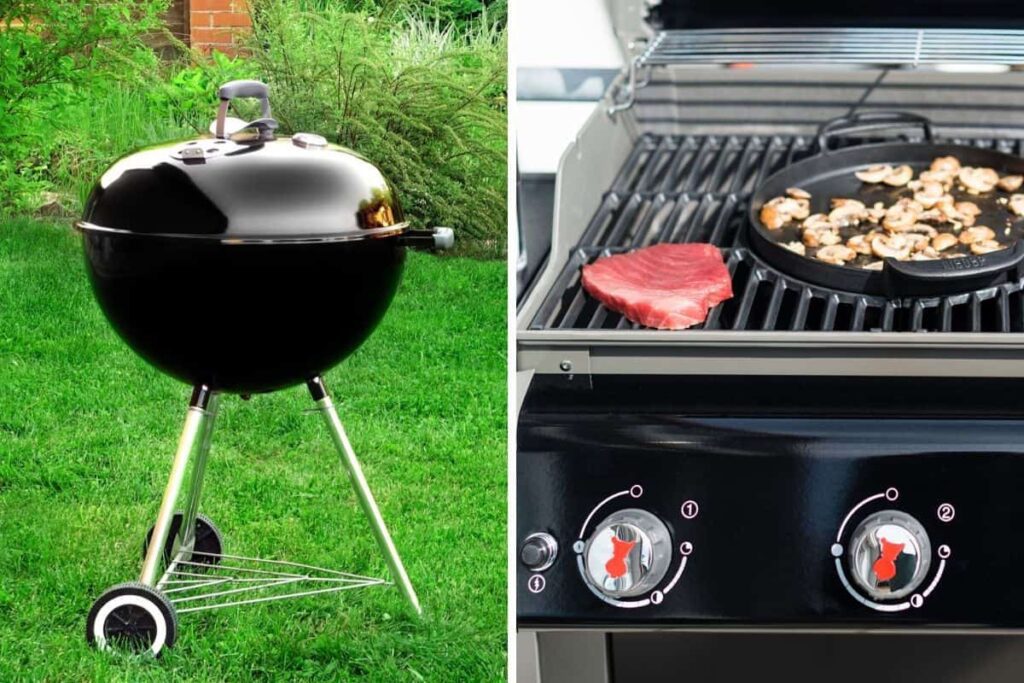
This image is property of www.foodfirefriends.com.
Personal Preference
Choosing between gas and charcoal grills ultimately comes down to personal preference. While some grillers prefer the convenience and ease of use offered by gas grills, others enjoy the ritual and traditional flavor of charcoal grilling. Consider your grilling needs, lifestyle, and cooking style to determine which grill type aligns best with your preferences.
Taste and Flavor Perception
When it comes to taste and flavor, gas and charcoal grills offer distinct characteristics. Gas grills provide a consistent and predictable flavor profile, with the option to add flavor-enhancing materials such as wood chips or aromatic herbs.
Charcoal grills, on the other hand, offer a more authentic and robust smoky flavor. The choice between the two ultimately depends on the specific flavors you enjoy and the overall experience you seek from your grilling sessions.
Individual Health Considerations
Individual health considerations should also be taken into account when choosing a grill type. If you have specific health concerns such as respiratory issues or are particularly sensitive to smoke or other grill emissions, gas grills may be a better option due to their cleaner combustion process.
Royal Gourmet GA4402S Gas Grill ReviewWhat Is Texas Style BBQ?


